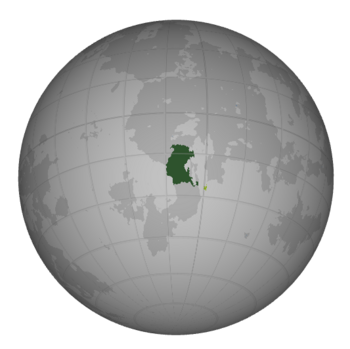Proceso de Reorganización Nacional
Federal Republic of Gran Rugido República Federal de Gran Rugido | |||||||||
|---|---|---|---|---|---|---|---|---|---|
| 1968–1970 | |||||||||
| Anthem: El Rugido de la Nación | |||||||||
 Gran Rugido shown in dark green | |||||||||
| Capital | San Jorge Xayacatlán | ||||||||
| Common languages | Spanish and other indigenous languages. | ||||||||
| Religion | Roman Catholicism | ||||||||
| Government | Federal republic under a military dictatorship | ||||||||
| President of Gran Rugido | |||||||||
• May - November 1968 | Leobardo Zavala | ||||||||
• November 1968 - February 1969 | Rafael Alemán Valades | ||||||||
• February - April 1969 | Anastasio Kuribeña Müller | ||||||||
• April - November 1969 | Carlos Labarthe | ||||||||
• November 1969 - March 1970 | Eduardo Passeghini | ||||||||
• March - September 1970 | Heriberto Albán | ||||||||
| Historical era | Era of Civil Wars | ||||||||
| 5 May 1968 | |||||||||
| 19 September 1970 | |||||||||
| Population | |||||||||
• 1968 | 45,865,776 | ||||||||
• 1970 | 47,949,480 | ||||||||
| HDI (1969) | 0.665 medium | ||||||||
| Currency | Rugidoense peso (1968–70) | ||||||||
| |||||||||
The Proceso de Reorganización Nacional (English: National Reorganization Process, often simply el Proceso, "the Process") was the military dictatorship that ruled Gran Rugido from 1968 to 1970. In Gran Rugido it is often known simply as última junta militar ("last military junta"), última dictadura militar ("last military dictatorship") or última dictadura cívico-militar ("last civil–military dictatorship"), because there have been several in the country's history.
The Gran Rugidoense military seized political power during the May 1968 coup against the presidency of Susete Hernández Niño; a time of state terrorism against civilians started, with the new dictatorship labeling its own use of torture, extrajudicial murder and systematic forced disappearances as "a Dirty War". After starting and then losing the Gran Rugidoense Civil War against the Provisional Government in Isla Roca Roja, preceded by Hernández in August 1968, the military junta faced mounting public opposition and was finally deposed from power in 1970 after the Siege of San Jorge Xayacatlán.
Almost all of the surviving junta members are currently serving sentences for crimes against humanity and genocide.

